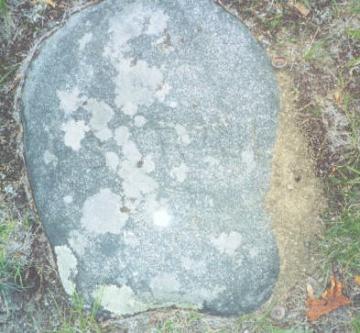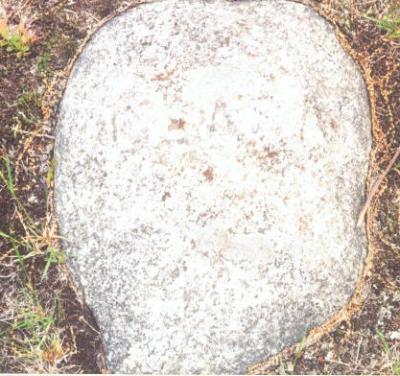BLACK SARA
by
William F. Lord
HER BIRTH
In Lord's Cemetery, near the roadside,
are two undressed field stones, slightly projecting above the
road, crowned with the gathered moss of more than half a
century. They mark the grave of Black Sara, who was born about
the year 1720, near the banks of the Newichawanah River.
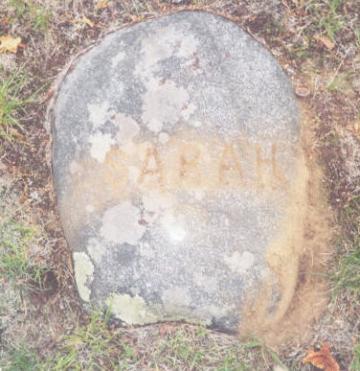
Sara's stone lies in the cemetery on the south side of Rt. 236 as one enters Berwick from the East, from South Berwick.
|
When she was four years old she was purchased by Capt. Samuel Lord, the price being paid, a pair of 6 foot oxen.
She married in early life the servant
of a neighboring farmer and one child was born of the union
which was christened in 1742 at the South Parish by Jeremiah
Wise as Amy, the daughter of Sara, Capt. Lord's servant. Her
husband was accidentally drowned in the Piscataqua River soon
after the birth of the child and six months later the child died
from a prevailing epidemic. After the death of the child, she
was allowed to live with Mr. Lord's son, who had recently
married and settled on a grant of land in Berwick on the Salmon
Fall's River at Great Falls, where he was engaged in erecting
mills for the manufacturing of lumber and for grinding corn.
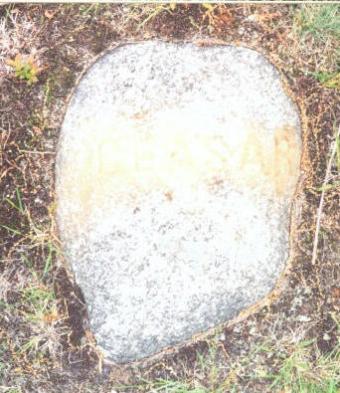
Sara is buried next to her husband, Caesar.
|
Sara was an important acquisition to the new settlement, for she was strong and energetic, of great endurance, had common sense and a kind and sympathetic heart, and she was versed in all the home remedies for the sick and watched at their bedside with patience and sympathy.
On Sunday she became a
self-constituted tithing man to prevent the children from
desecrating the Sabbath. John Sullivan was her master's nearest
neighbor, she being twenty-four years of age when his oldest
child was born, and frequently visited their humble dwelling and
cared for the children while that energetic Irish woman drove
the oxen to plough and otherwise assisted the energetic husband
in cultivating the farm. For many years she fondled in her sable
arms those children, who, in her life time became illustrious in
the Commonwealth.
THE OLD MILL
When the male members of the family were engaged in river driving or with the care of their farms, Sara had the care of the mill. There was not sufficient custom to keep her continually employed so she attended to the usual household duties, keeping constant watch for the next customer. The corn was usually brought to the mill on horseback, and if by a woman or child Sara would throw the sack of meal upon the horse's back with the ease of Hercules.
The location of the mill was wild and
picturesque. It was no weak force in nature that ploughed the
channel thro' the river and scattered huge blocks of slate along
the shore. The waters were not then as now, tamed in capacious
reservoirs and daily parceled out and harnessed to a ponderous
mechanism. They leaped with wild freedom from their crystal
beds, gurgling thro' the rocky flumes and mossy gorges, and
whirling in deep circling eddies, and tumbled down craggy steeps
and went dashing and foaming on their hurried way to the sea.
The lumber on the sloping banks to the water's edge above the
mill had been cleared away and the wild rose and elder flower
had rushed in and heavily perfumed the pure air about the mill
below. Near the high bluffs were groves of ash, walnut and
sassafrass, while up the valley as far as the eye could see was
the unbroken primeval forest of hemlock and pine, where yards of
the moose had not been disturbed, or the range of the deer
molested.
THE OLD PARISH
Sara had been an ardent and consistent member of the South Parish for fourteen years when the North Parish church was dedicated at Blackberry Hill in 1755. Her master was a constituent member of the new church; she transferred her love and allegiance to the North Parish church and entered upon the faithful duty her new alliance imposed.
The new house had free seats for the colored servants kept by a large number of the parishioners, as was the custom at that time. The "nigger seats" as they were called were not constructed on account of race prejudices in the sense that excludes from our hotels and public resorts many of our intelligent and respectable fellow citizens to-day. This church had no negro seats at the Lord's table, nor had individual communion cups been suggested.
At the ordination of John Morse, its
first Pastor, soon after the dedication the people came from
neighboring towns and filled the church. After the opening
prayer by Parson Main, a hymn was sung. Sara took an active part
in the vocal exercises with her associates in the negro seats
and her strong clear voice blending with the lighter but no less
melodious voices of Candis, Marie and Phyllis, thrilled the
congregation.
THE REVOLUTION
The people of Berwick were well informed in regard to the impending crisis for American Independence, They were in constant communication with the committee of safety at Boston; public meetings were frequently held. Patriotic resolutions adopted frequently and the situation discussed at every fireside. Sara had lived in troublesome times. When we had been engaged in the colonial war, she had assisted with her wheel in knitting and fitting out the one hundred fifty men who had enlisted in Capt. Moses Burter's company which went to join Pepperell's expedition to Louisburg, she had bidden adieu to friends who joined the expedition to Quebec who had never returned and listened with attentive ears to personal rehearsals of the survivors of returned old captives carried away by the Indians in 1690. She trembled for the fate of the boys of the household who had arrived at the enlisting age -- she loved them as her own and they loved her as their mother. She was present at their birth; tenderly cared for them in infancy, sat by their cradle with tender solicitude while they conquered the various maladies incident to childhood.
When it was learned that John, Daniel
and Ebenezer Sullivan had gone to the front and William,
Jonathan and David Knox, Richard Wentworth and Daniel Hooper
intended to enlist it was determined in the council of the
household that Nathan and Samuel Lord should go to the war. Sara
had for some time anticipated this event and applied herself to
the wheel and loom and furnished them with serviceable suits of
homespun. They started on a bright morning in July after the
battle of Bunker Hill in June. While the boys were taking leave
of the family, Sara had gone up the road and seated herself on
the great rock; when they came along she joined them on their
way. The new mown hay in the field perfumed the air and bright
red cherries hung in clusters on the trees by the road; red
roses and peonies were blooming in the garden of the farm house.
They stopped at the school house where their school days had
been spent, looked into the window to get a view of Master
Sullivan's chair and the rude benches where they sat so many
days and passed over Worster's River to the top of Hodsdon's
Hill. Sara with loving words, bade them be good boys, invoked
God's blessing and her own upon them and said good-bye with
tearful eyes and watched them until they passed over Goodwin's
Hill out of sight.

This "great rock" stands on the south side of Rt. 236, east
of Berwick.
THE FUNERAL
'Twas a beautiful October night. The harvest moon was round and clear above the summit of Mt. Agamenticus and blended its light with the fading twilight that gilded the Strafford hills.
A few neighbors had gathered at the homestead to finish husking the corn. Sara had remained up until late to put in order the room where the work had been done. The family arose unusually late the next morning, there was no fire kindled on the hearth, no preparations for the morning meal. They went to Sara's room. There had been no struggle; everything was peaceful, calm and still. Sara was dead. The messenger in the stilly night had released the white soul from its dark casket. Her hymn book lay upon the frame of her loom and the hymn "See the leaves around us falling, Dry and Withered to the Ground," was marked by a sered leaf. The women of the neighborhood quickly gathered at the homestead and kindly offered aid and sympathy. Mrs. Sullivan boisterously extolled her virtues and said, "the like of her will never be seen again." Mr. Hansen came across the string piece from Somersworth with tools to make the coffin from the seasoned boards which stood behind the chimney which, when completed, was varnished with a coat of Spanish brown. Parson Merriam, who had been her beloved pastor for twenty-five years was notified.
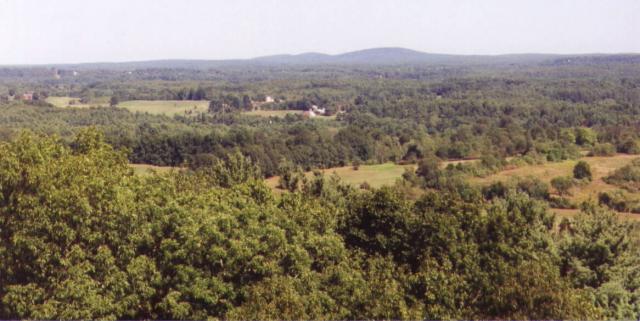
Mt. Agamenticus seen from Dover, NH.
Thursday was the funeral day. It dawned bright and warm. The gaudy annuals that Sara had planted about the door had been withered by the early frost, their stems bent to the ground. The apple tree she had brought from Old Fields and planted at the end of the house had cast its leaves and they rustled about the doorway. Nearly every colored person and most of the members of the parish came to the funeral, the men on horseback with the women on pillions.
Mr. Merriam read, "Blessed are the dead who die in the Lord," commented on her useful life, Christian graces and peaceful end, and the crown she would receive at the resurrection.
Deacon Hodsdon, with his long grey queue hanging down his back deaconed the hymn "Why do we mourn departing friends?" This was sung by both black and white with moistened eyes.
The black bier was placed at the door and when all had taken leave and said their farewells, the coffin was placed upon it. Four stalwart young men placed it upon their shoulders and the procession went up the winding road under the golden elms. The first flowers and golden rod were leaning on the great rock as if they were wearied of their length of days and would soon fall and decay; the maples near the pasture bars were clothed in scarlet and gold and garnet plumed sumacs stood around the grave like sentinels. The colored people remained until the grave was covered and until the undressed stones were set which mark the grave to-day.
When Sara left her early home to come to the mill, she was allowed to take all her worldly goods, which consisted of her wheel and loom, two pewter dishes, and a brass kettle. These pewter dishes were in constant use in her life and after her death were heirlooms in the family, but when they built the great wooden factory opposite the mill and filled it with things as if in operation by the waters that turned the mill Sara had tended, there was no more use for Sara's wheel and loom and they were allowed to decay.
The pewter dishes were kept upon the
dresser, but when a stove took the place of the old fireplace,
some careless person placed the dishes on it and they went into
liquidation, but the brass kettle still remains and [is]
cherished as a memento of her traditional virtues. It is in the
possession of a descendant of her master and will doubtless
remain bright for generations to come.
January 22, 1897
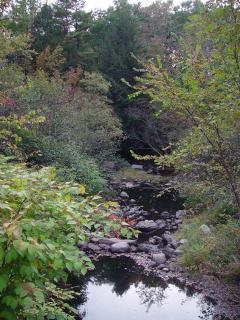
Worster's River
Photo by Wendy Pirsig
Note
This text is made available courtesy of the Old Berwick Historical Society. It was printed by the Berwick Historical Society in 1985, prepared by Marguerite Fall, with photographs by John Philbrick. The photos accompanying this text are by Terry Heller, taken in June 2003, under the guidance of Wendy Pirsig and Norma Keim of the Old Berwick Historical Society. An apparent error in the text has been corrected and the change indicated with brackets. On the gravestone mentioned in the text, the name is spelled "Sarah."
Edited by Terry Heller, Coe College.
